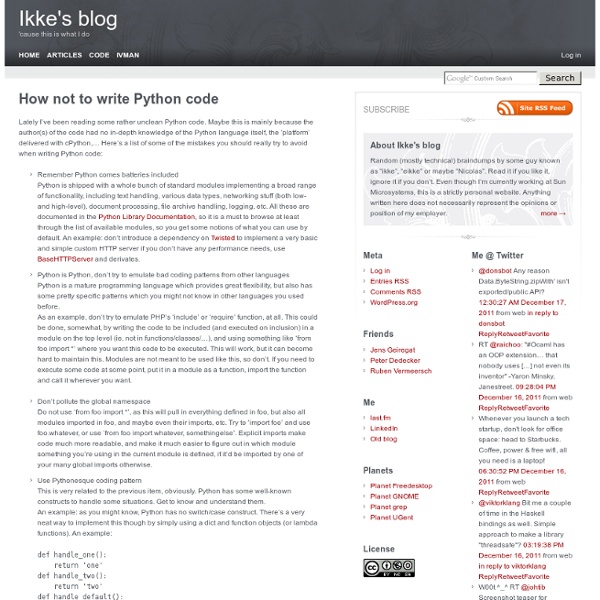Essential Python Reading List
Here’s my essential Python reading list. I’ve tried to order the items so you can pause or stop reading at any point: at every stage you’ll have learned about as much possible about Python for the effort you’ve put in. The Zen of Python
Ned Batchelder's Blog
PyCon 2014 is over, and as usual, I loved every minute. There are a huge number of people that I know there, and about 5 different sub-communities that I feel an irrationally strong attachment to. Some highlights: I gave a talk entitled Getting Started Testing, which people seemed to like, though if you are interested, I can point out the five places I messed up...Jenny turned me into a cute illustration, which was a fun surprise.I was super-proud of Michelle Fulwood, who has been working on an Arabic learning tool at Boston Python project nights, and always demurred when I brought up the idea of her talking about it. But Sunday morning, she gave a kick-ass lightning talk about it! My head is still spinning from the high-energy four days I've had, I'm sure I'm leaving out an important high point.
Top 30 Python Projects In GitHub
There are several repositories for Python language in GitHub and we are providing you with a list of top 30 among them. 1. Django a high-level Python Web framework that encourages rapid development and clean, pragmatic design
Distutils-SIG
Charter The Distutils-SIG exists to discuss the design, implementation, and maintenance of a suite of module distribution utilities for Python. These utilities are grouped in the 'distutils' package in Python. The goal of distutils is to make building, packaging, distributing, and installing Python modules, extensions, and applications painless and standardized.
wxPython tutorial
This is wxPython tutorial. In this tutorial, you will learn the basics of GUI programming in wxPython. The tutorial is suitable for beginners and intermediate programmers. Table of contents wxPython wxPython is a cross platform toolkit for creating desktop GUI applications.
ctypes tutorial
Note: The code samples in this tutorial uses doctest to make sure that they actually work. Since some code samples behave differently under Linux, Windows, or Mac OS X, they contain doctest directives in comments. Note: Quite some code samples references the ctypes c_int type. This type is an alias to the c_long type on 32-bit systems.
Test-Driven Development with Python
Test-Driven Development with Python Test-Driven Development with Python Harry Percival Gillian McGarvey
10 bad habits to break if you want to become a great developer
Pursuing a career as a developer is a wise choice: The US Bureau of Labor and Statistics predicts software developer jobs will grow 17% between 2014 and 2024—much faster than the average rate of other professions. Meanwhile, front end developers, full stack developers, mobile developers, and back end developers are all currently in the top 10 hardest to fill tech jobs, according to data from job search site Indeed.com. However, a number of common mistakes arise for those who are new to the field that could make your entry to a successful career more difficult. Here are the 10 most crucial bad habits to break when you first become a developer.



